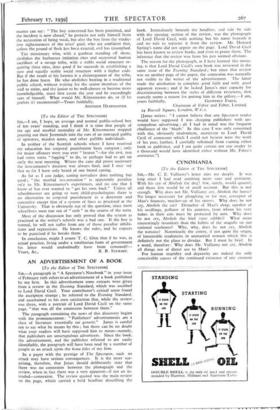AN ADVERTISEMENT OF A BOOK
[To the Editor of THE SPECTATOR] SIR,—A paragraph in " A Spectator's Notebook " in your issue of February roth refers to an advertisement of a book published by my firm. In this advertisement some extracts were given from a review in the Evening Standard, which was ascribed to Lord David Cecil. Your contributor's critical sense found the ascription strange ; he referred to the Evening Standard, and ascertained to his own satisfaction that, while the review was there, with a portrait of Lord David Cecil on the same page, " that was all the connexion between them."
The paragraph containing the news of this discovery begins with the pronouncement : " Publishers' advertisements are a class of literature essentially sui generic." Janus is careful not to say what he means by this ; but there can be no doubt what your readers will have supposed him to mean—namely, that publishers are unscrupulous advertisers. Since the book, the advertisement, and the publisher referred to are easily identifiable, the paragraph will have been read by a number of people as an attack upon the bona fides of my firm.
In a paper with the prestige of The Spectator, such an attack may have serious consequences. It is the more sur- prising, therefore, that Janus should deliberately state that there was no connexion between the photograph and the review, when in fact there was a very apparent—if not an in- tended—connexion. The review quoted was the main review on the page, which carried a bold headline describing the book. Immediately beneath the headline, and side by side with the opening section of the review, was the photograph of Lord David Cecil, with nothing but his name beneath it and no rule to separate it from the review. Mr. Howard Spring's name did not appear on the page. Lord David Cecil has been known to review books, and even to praise them. The inference that the review was from his pen seemed obvious.
The reason for the photograph, as I have learned this morn- ing, is that Lord David Cecil's own book was reviewed in the same issue of the Evening Standard ; but since that review was on another page of the paper, the connexion was naturally not visible to the writer of the advertisement. The latter made the attribution in complete good faith and with good apparent reason ; and if he lacked Janus's nice capacity for discriminating between the styles of different reviewers, that scarcely seems a reason for putting him in the pillory.—I am, [Janus writes: " I cannot believe that any Spectator reader would have supposed I was charging publishers with un- scrupulous advertising ; all I had in mind was the frequent ebullience of the ' blurb.' In this case I was only concerned with the, obviously inadvertent, ascription to Lord David Cecil of comments which I could not beiieve were the work of his pen; further, I carefully refrained from naming either book or publisher, and I am quite certain not one reader in a thousand would have identified either without Mr. Faber's assistance."]










































 Previous page
Previous page